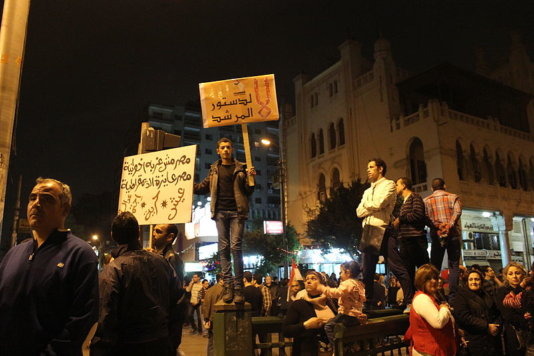- About
- Topics
- Picks
- Audio
- Story
- In-Depth
- Opinion
- News
- Donate
-
Signup for our newsletterOur Editors' Best Picks.Send
Read, Debate: Engage.
| February 13, 2013 | |
|---|---|
| tags: | #Arab Spring, #Egypt, #Hosni Mubarak, #mohamed morsi, #Muslim Brother, #protests, #revolution, #Tunisia |
| located: | Egypt, Tunisia |
| by: | Sara Jabril |
The world, and the west in particular, looked on cautiously as the Muslim Brotherhood emerged victorious in Egypt's first democratic presidential election since the ouster of Hosni Mubarak. In June 2012, the country's new president - Mohamed Morsi - took his oath of office in front of an eager crowd in Tahrir Square, telling the people of Egypt that they were the source of power, which they both grant and withdraw. Less than a year later, Mr. Morsi might be surprised at how quickly the withdrawal aspect of his declaration has come to pose a very real threat to his political authority.
Since January 25th 2013, the date marking the anniversary of Egypt's revolutionary transition, scenes on the streets of Cairo and other cities look uncannily familiar. As with Hosni Mubarak, angry demonstrators are venting their anger at the new president, taking to the streets in protests that have spread throughout the country. The current turmoil in Tunisia, the birthplace of the Arab Spring, following the shocking assassination of a secular opposition leader, comes as a stark reminder for Egypt's Islamist Muslim Brotherhood, showing them the extent of "damage" that an increasingly divided society can do - a swift withdrawal of power being one example.
A glance at some of the initial causes of the revolution two years ago also sheds some light on why we might be seeing similar scenes on Egypt's streets. Police brutality, unemployment, rising prices and low minimum wages are all problems that haven't been sufficiently addressed or solved. Economic issues in particular, could soon reach a critical mass in the current climate of mounting frustration among Egyptian citizens. Moreover, a report by Amnesty International revealed that discrimination against religious minorities, such as Coptic Christians, is still a pressing issue.
What we are seeing in Egypt today is a crucial point in the course of the country's history that will determine where the path of democracy will lead. President Morsi and the Muslim Brotherhood must reevaluate their stand and priorities. As a recent piece in The Economist rightfully pointed out:
"He [Mr. Morsi] speaks with new seriousness of being open to revising the constitution. He is working on securing backing from the International Monetary Fund for economic reform. Without broad support, though, enacting such reform will be impossible, and so far he has rejected demands to form a broader-based government of national unity"
Image: (c) Gigi Ibrahim via WikiCommons

By copying the embed code below, you agree to adhere to our republishing guidelines.
